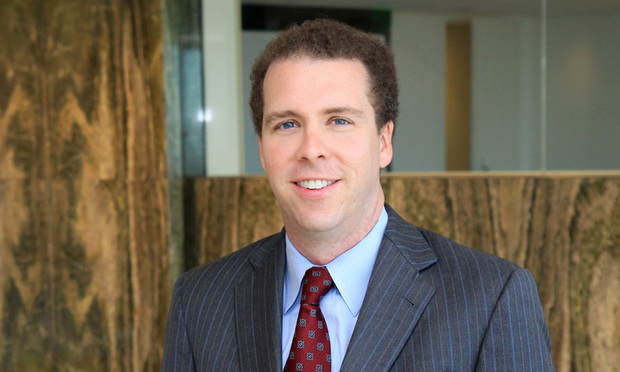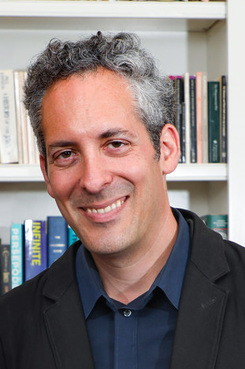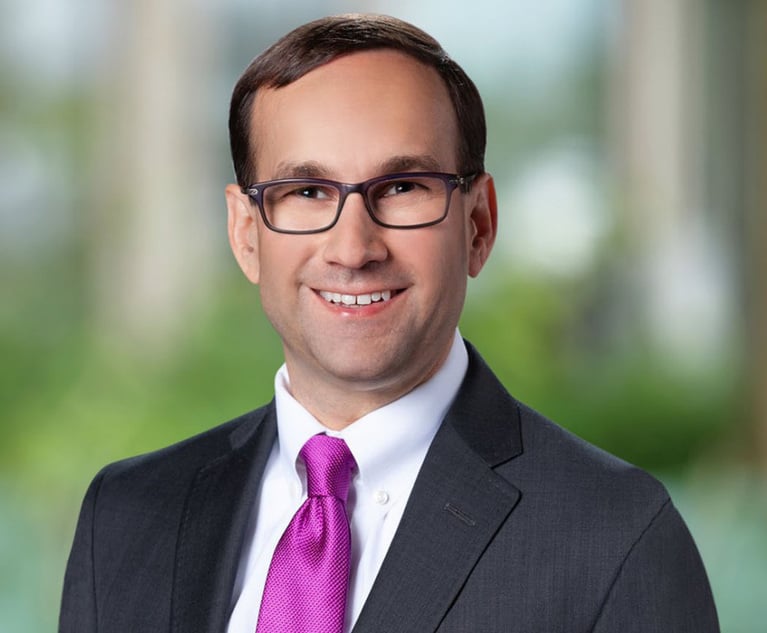Unusual Omissions Seen in RB Group's Recent Nonprosecution Deal
A professor at Duke University School of Law said it is typical for the agreements to include language that prohibits the company from denying its acceptance of responsibility. There is no such language in this agreement.
July 16, 2019 at 05:26 PM
4 minute read
 Ryan McConnell of the R. McConnell Group. (Courtesy photo)
Ryan McConnell of the R. McConnell Group. (Courtesy photo)
Global consumer goods conglomerate Reckitt Benckiser Group announced last week a record $1.4 billion civil settlement with the federal government over sales and marketing of the opioid Suboxone. The settlement included what appears to be an unprecedented nonprosecution agreement that allows the company to deny any wrongdoing.
Brandon Garrett, a professor at Duke University School of Law, told Corporate Counsel the agreement was unusual. “It is typical for a corporation to admit, accept, and acknowledge responsibility for both acts set forth in a statement of facts and specific criminal law violations, in a nonprosecution agreement,” Garrett said.
 Brandon L. Garrett (Courtesy photo)
Brandon L. Garrett (Courtesy photo)He said it is also typical for the agreements to include language that prohibits the company from denying its acceptance of responsibility. There is no such language in this agreement. Attorney Ryan McConnell, a former federal prosecutor and founder of the R. McConnell Group in Houston, said he has “never seen a nonprosecution agreement without that sentence.”
Not only does the agreement not carry the language, a separate civil settlement in the case explicitly states that RB Group does not admit liability and “denies the allegations in the covered conduct [section] and in the civil actions” brought by six whistleblowers.
The U.S. Department of Justice's press release did not mention the denial. But the RB Group issued its own media statement, saying, “While RB has acted lawfully at all times and expressly denies all allegations that it engaged in any wrongful conduct, after careful consideration, the board of RB determined that the agreement is in the best interests of the company and its shareholders. It avoids the costs, uncertainty and distraction associated with continued investigations, litigation and the potential for an indictment.”
McConnell, who is an occasional contributing writer to Corporate Counsel, said nonprosecution agreements also usually contain a statement of facts that makes clear how the company violated the law. Typically the company must accept the statement and those facts can be used against the company should there be later legal action, he explained. In this case, there was no statement of facts.
“It seems to me like they are saying, it's a civil case,” McConnell said. “But then why the nonprosecution agreement?”
The company and its general counsel, Rupert Bondy, did not return messages seeking comment. Howard Shapiro, litigation chair at Wilmer Cutler Pickering Hale and Dorr, represented the company along with partner, Kimberly Parker. Shapiro said he could not comment.
The prosecutors were mum too. The U.S. Department of Justice and the U.S. attorney's office in the Western District of Virginia, which took part in the deal, did not return messages. A spokesman for the U.S. attorney's office in New Jersey, which also took part, said that office could not comment.
Garrett, the law professor, declined to speculate on why prosecutors reached such a deal. But one observer said it was obvious that the company refused to sign anything that acknowledged wrongdoing.
And since this was an opioid case—which are high priority with federal prosecutors in the Trump administration—the government wanted a deal that let it claim victory with a record $1.4 billion penalty.
One source close to the case also said the company wanted the nonprosecution agreement on top of the civil settlement as a sort of protection against potential criminal charges later.
The civil settlement included the U.K.-based group and its subsidiary in New Jersey, Reckitt Benckiser LLC. In 2014, when the investigation arose, the group spun off a pharmaceutical subsidiary, Indivior, that no longer has an affiliation with the company.
Indivior has been indicted in the case and is scheduled to go on trial in Virginia on May 11. In the settlement, RB Group agreed to cooperate with prosecutors in that investigation.
This content has been archived. It is available through our partners, LexisNexis® and Bloomberg Law.
To view this content, please continue to their sites.
Not a Lexis Subscriber?
Subscribe Now
Not a Bloomberg Law Subscriber?
Subscribe Now
NOT FOR REPRINT
© 2025 ALM Global, LLC, All Rights Reserved. Request academic re-use from www.copyright.com. All other uses, submit a request to [email protected]. For more information visit Asset & Logo Licensing.
You Might Like
View All

Baker Botts' Biopharma Client Sues Former In-House Attorney, Others Alleging Extortion Scheme

People and Purpose: AbbVie's GC on Leading With Impact and Inspiring Change
7 minute read
Sage Therapeutics Axes GC After Drug-Pipeline Failures Force Cost-Cutting
Trending Stories
- 1Supreme Court Takes Up Challenge to ACA Task Force
- 2'Tragedy of Unspeakable Proportions:' Could Edison, DWP, Face Lawsuits Over LA Wildfires?
- 3Meta Pulls Plug on DEI Programs
- 4On the Move and After Hours: Meyner and Landis; Cooper Levenson; Ogletree Deakins; Saiber
- 5State Budget Proposal Includes More Money for Courts—for Now
Who Got The Work
Michael G. Bongiorno, Andrew Scott Dulberg and Elizabeth E. Driscoll from Wilmer Cutler Pickering Hale and Dorr have stepped in to represent Symbotic Inc., an A.I.-enabled technology platform that focuses on increasing supply chain efficiency, and other defendants in a pending shareholder derivative lawsuit. The case, filed Oct. 2 in Massachusetts District Court by the Brown Law Firm on behalf of Stephen Austen, accuses certain officers and directors of misleading investors in regard to Symbotic's potential for margin growth by failing to disclose that the company was not equipped to timely deploy its systems or manage expenses through project delays. The case, assigned to U.S. District Judge Nathaniel M. Gorton, is 1:24-cv-12522, Austen v. Cohen et al.
Who Got The Work
Edmund Polubinski and Marie Killmond of Davis Polk & Wardwell have entered appearances for data platform software development company MongoDB and other defendants in a pending shareholder derivative lawsuit. The action, filed Oct. 7 in New York Southern District Court by the Brown Law Firm, accuses the company's directors and/or officers of falsely expressing confidence in the company’s restructuring of its sales incentive plan and downplaying the severity of decreases in its upfront commitments. The case is 1:24-cv-07594, Roy v. Ittycheria et al.
Who Got The Work
Amy O. Bruchs and Kurt F. Ellison of Michael Best & Friedrich have entered appearances for Epic Systems Corp. in a pending employment discrimination lawsuit. The suit was filed Sept. 7 in Wisconsin Western District Court by Levine Eisberner LLC and Siri & Glimstad on behalf of a project manager who claims that he was wrongfully terminated after applying for a religious exemption to the defendant's COVID-19 vaccine mandate. The case, assigned to U.S. Magistrate Judge Anita Marie Boor, is 3:24-cv-00630, Secker, Nathan v. Epic Systems Corporation.
Who Got The Work
David X. Sullivan, Thomas J. Finn and Gregory A. Hall from McCarter & English have entered appearances for Sunrun Installation Services in a pending civil rights lawsuit. The complaint was filed Sept. 4 in Connecticut District Court by attorney Robert M. Berke on behalf of former employee George Edward Steins, who was arrested and charged with employing an unregistered home improvement salesperson. The complaint alleges that had Sunrun informed the Connecticut Department of Consumer Protection that the plaintiff's employment had ended in 2017 and that he no longer held Sunrun's home improvement contractor license, he would not have been hit with charges, which were dismissed in May 2024. The case, assigned to U.S. District Judge Jeffrey A. Meyer, is 3:24-cv-01423, Steins v. Sunrun, Inc. et al.
Who Got The Work
Greenberg Traurig shareholder Joshua L. Raskin has entered an appearance for boohoo.com UK Ltd. in a pending patent infringement lawsuit. The suit, filed Sept. 3 in Texas Eastern District Court by Rozier Hardt McDonough on behalf of Alto Dynamics, asserts five patents related to an online shopping platform. The case, assigned to U.S. District Judge Rodney Gilstrap, is 2:24-cv-00719, Alto Dynamics, LLC v. boohoo.com UK Limited.
Featured Firms
Law Offices of Gary Martin Hays & Associates, P.C.
(470) 294-1674
Law Offices of Mark E. Salomone
(857) 444-6468
Smith & Hassler
(713) 739-1250






